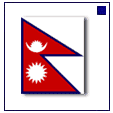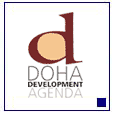- home
- resources
- focus newsletter
- focus 60
n

WTO membership rises to 147
back to top
The Kingdom of Nepal, on 23 April, became the 147th member of the
World Trade Organization.
Nepal started its accession negotiations in 1989. The 5th WTO抯
Ministerial Conference, at Canc鷑 (Mexico), approved the accession
package on 11 September 2003. On 24 March 2004 the Government of the
Kingdom of Nepal notified the WTO that the process of ratification and
acceptance of the Protocol of Accession had been completed. According
to established practice, the entry into force of the Protocol occurred
30 days later ?on 23 April 2004.
Another 24 countries are in the process of negotiation to become
members of the WTO.
These are (arranged by the date of their application): Algeria,
Russian Federation, Saudi Arabia, Belarus, Ukraine, Sudan, Uzbekistan,
Viet Nam, Seychelles, Tonga, Kazakhstan, Azerbaijan, Andorra, Lao
People抯 Democratic Republic, Samoa, Lebanese Republic, Bosnia
Herzegovina, Bhutan, Cape Verde, Yemen, Serbia and Montenegro,
Bahamas, Tajikistan and Ethiopia.
Dr. Supachai: 揥e must redouble our efforts?/span>
back to top
Director-General Supachai Panitchpakdi, in his
remarks on 21 April as chairman of the Trade
Negotiations Committee, warned negotiators that 搕he coming days and
weeks are critical? He said Ministers 揳re more determined than ever to
succeed,?and that 搕he onus is clearly on the negotiators in Geneva to
turn this political will into concrete results?
He said that 搕he new Chairpersons of the bodies established by the TNC
have also been working hard since their appointment in order to move the
negotiations forward,?and cited the following written reports:
Special
Session of the Council for TRIPS;
Negotiating Group on Market
Access; Negotiating Group on Rules;
Special Session
of the Council for Trade in Services;
Special Session of the
Committee on Trade and Development; and
Special Session of
the Committee on Trade and Environment.
General Council Chairman Amb. Shotaro Oshima, during an informal meeting
of Heads of Delegation on 29 April, urged members to deliver concrete
results by July to 揺nsure the continued progress in the negotiations?
He said that at the April TNC meeting, 搕here were encouraging signs of
commitment to progress as well as some warning signals?
Ambassador Oshima said that 搕here was also a widely-based informal
understanding that the aim is to reach agreements at a framework level
by the summer, and the Director-General and I both sense a clear
willingness to work hard to reach this aim?
> More
Director-General Supachai, in a
statement before the International Monetary and Financial
Committee in Washington on 24 April, cited the IMF's Trade Integration
Mechanism for developing countries as 揳 welcome contribution to the
Doha Round, in particular to attaining ambitious market access results?
He said that 搕he Mechanism can help reassure low income developing
countries that they will receive assistance from the international
community to deal with adjustment difficulties they encounter from the
loss of trade preferences which will result automatically from the
lowering of MFN tariffs at the end of the Doha Round?
n


Goods Council agrees on chairpersons of subsidiary bodies
back to top
The Council for Trade in Goods, on 27 April, agreed on a slate of
chairpersons of its subsidiary bodies for this year.
The new chairpersons are: Committee on Agriculture: Mr. Roald P.
Lapperre (Netherlands); Committee on Anti-Dumping: Mr. Ernesto
Fern醤dez (Costa Rica); Committee on Customs Valuation: Mr. Robin
Twyman (United Kingdom); Committee on Import Licensing: Ms. V.
Campeanu (Romania); Committee on Market Access: Dr. Magdi Farahat
(Egypt); Committee on Rules of Origin: Ms. V. Thorstensen (Brazil);
Committee on Safeguards: Mr. Herv?Drouet (France); Committee on
Sanitary and Phytosanitary Measures: Mr. Gregg Young (United States);
Committee on Subsidies and Countervailing Measures: Mr. J. Hirose
(Japan) ; Committee on Technical Barriers to Trade: Mr. Sudhakar
Dalela (India); Committee on Trade-Related Investment Measures: Mr.
Sivaramen Palayathan (Mauritius); Working Party on State Trading
Enterprises: Mr. R. Mosisili (Lesotho); ITA Committee: Mr. Fr閐閞ic
Seppey (Canada).
The Council also welcomed its new Chairperson, Ambassador Alfredo
Vicente Chiaradia of Argentina, and paid tribute to its outgoing
Chairperson, Ambassador Milan Hovorka of the Czech Republic.
> More
Stronger than expected growth spurs modest trade recovery
back to top
Propelled by higher than expected economic growth in Asia and the
United States, world trade recovered at an increased rate in 2003, and
could expand further in 2004 should the global economy continue to
improve, according to the WTO抯 latest figures, released on 5 April.
A 2.5 per cent increase in global output in 2003 spurred world trade
to recover by 4.5 per cent. While this growth was stronger than
expected a year ago after the outbreak of severe acute respiratory
syndrome (SARS) and the build-up of tensions in the Middle East, trade
and output expansion in real terms in 2003 remained below the average
rates recorded since 1995.
However, WTO economists say that with global GDP growth expected to
reach 3.7 per cent in 2004, world trade could expand by 7.5 per cent
in 2004, although there are a number of risks associated with these
projections ?including the possibility of slower than expected import
growth in the United States and a faltering in demand recovery in
Western Europe.
揅learly, the improved economic situation in the United States and
Asia has given an important boost to world trade,?said WTO
Director-General Supachai Panitchpakdi. 揃ut when you look around the
world, the pace of trade growth remains uneven and there remain many
barriers to trade globally. Greater expansion of trade would provide
support for sustained economic growth and job creation. If this
potential is to be realised the many trade distortions that exist must
be addressed, and the best way to do that is to bring about a
successful conclusion to the Doha Development Agenda.?br>
> More
WTO Secretariat reports significant decline in new anti-dumping investigations back to top
The WTO Secretariat reported, on 20 April 2004, that in the period 1
July-31 December 2003, 14 Members initiated 115 anti-dumping
investigations against exports from a total of 30 different
countries or customs territories. This represents a significant
decline from the corresponding period of 2002.
India initiated the most investigations during the second semester
of 2003, 33, a significant decline from the 56 investigations it had
initiated during the second semester of 2002. The United States had
the second highest number of initiations (21) during the second
semester of 2003, up from 13 during the corresponding period of
2002. China reported 11 initiations, up from 6 during the
corresponding period of 2002. Canada, Mexico, and Australia
reported, respectively, 9, 8, and 7 initiations each. The eight
other Members who reported initiations reported 5 or fewer
initiations each.
China remains at the top of the list of countries subject to
anti-dumping investigations, with 30 investigations initiated on its
exports during the second semester of 2003, the same number as
during the corresponding period of 2002. The United States, the
European Communities, and Japan were next, with, respectively, 12,
8, and 8 investigations initiated on their exports in the second
semester of 2003. India and Korea followed with 7 each, while
Chinese Taipei had 6 investigations initiated on its exports. 23
other countries or customs territories each had 4 or fewer
investigations initiated on their exports during the second semester
of 2003.
> More

The Dispute Settlement Body, on 26 April, adopted the panel report on
揢nited States ?Investigation of the International Trade Commission in
softwood lumber from Canada?
Canada welcomed the panel's conclusion and urged the US to bring its
measures into conformity as soon as possible. The US disagreed with the
panel's ultimate conclusion but decided not to appeal because it
believed that the practical significance of that factual conclusion was
limited. The US also highlighted some of the panel's conclusions which
it supported.
At its meeting on 20 April, the DSB adopted the Appellate Body and panel
reports on India's complaint concerning the EC's GSP scheme (DS246).
> More
In April, the WTO issued the following panel reports:
- On 2 April, on the United States?complaint regarding ?b>Mexico ? Measures affecting telecommunications services?(WT/DS204/R).
- On 6 April, on United States?complaint against ?b>Canada ?Measures relating to exports of wheat and treatment of imported grain? (WT/DS276/R); and
- On 13 April, ?b>United States ?Final dumping determination on softwood lumber from Canada?(DS/264/R);
The Appellate Body, on 7 April, issued its report on India's complaint
against the EC in ?b>European Communities桟onditions for the Granting of
Tariff Preferences to Developing Countries?(WT/DS246/AB/R).
Appellate Body Chairman Georges Abi-Saab, on 8 April, sent a letter to
the Chairperson of the Dispute Settlement Body requesting comments from
Members on a number of possible amendments to the Working Procedures for
Appellate Review. The letter and the text of the proposed amendments
were circulated as WTO document
WT/AB/WP/8.
On another matter, Mr. Abi-Saab noted with great sadness the passing on
11 April of Dr. Said El-Naggar of Egypt, who was one of the original
seven members of the Appellate Body. He was appointed in December 1995
and served until 31 March 2000. During his term, he served on twelve
Appellate Body Divisions and as arbitrator in two arbitrations under
Article 21.3(c) of the Understanding on Rules and Procedures Governing
the Settlement of Disputes. He was serving as Chairman of the Panel in
揔orea ?Measures Affecting Trade in Commercial Vessels?when he died.

Three months of WTO training for 25 developing-country officials back to top
Deputy Director-General Roderick Abbott, on 26 April, launched the
29th WTO Trade Policy Course organized by the Institute for Training
and Technical Cooperation.
Twenty-five officials from developing countries will have the
opportunity to spend three months becoming conversant with the rules
and functioning of the organization. This training course is to cover
all WTO issues and will take the form of presentations and both
interactive and simulation exercises. Participants will also be able
to attend certain WTO working body meetings. Furthermore, they will
have the chance to become acquainted with the work of other
international organizations which are active in the fields of trade
and development through visits set up in conjunction with UNCTAD, the
ITC, WIPO and the World Bank.
Meanwhile, 24 government officials from 22 African countries attended
on 14 April the opening ceremony for the Third Regional Trade Policy
Course, organized by the WTO Secretariat in partnership with the
University of Nairobi.
The ceremony was attended by Hon. Dr. Mukhisa Kituyi, MP and Minister
for Trade and Industry of Kenya, as well as by representatives from
the University of Nairobi, and Mr. Paul Rolian, Director of the WTO
Institute for Training and Technical Cooperation.
During the month, the following trade policy courses were concluded:
-
Thirty-one government officials from 17 countries/territories attended on 22 April the closing ceremony marking the conclusion of the Caribbean Regional Trade Policy Course, organized by the WTO Secretariat in partnership with the University of the West Indies.
-
Participants from 56 countries, on 2 April, attended the closing ceremony of the 27th and 28th WTO Trade Policy Courses held in Geneva.
The Government of the Republic of Korea, on 27 April, made a
contribution of US$ 200,000 (CHF 250 000) to the Doha Development
Agenda Global Trust Fund.
Ambassador Choi Hyuck, Korea's Permanent Representative to the WTO and
Dr. Supachai Panitchpakdi, Director-General of the WTO signed the
Memorandum of Understanding on the contribution by Korea.
揂s one of the countries that have traded their way out of poverty,
Korea stands firm in its faith that increased participation in the
multilateral trading system is the key for economic development?said
Korean Ambassador Choi Hyuck. 揟he WTO technical assistance activities
provide a highly valuable opportunity for developing and
least-developed countries to strengthen their capacity to realize the
gains from participation in the multilateral trading system. Korea抯
yearly contribution represents its continued support for WTO's
commitment to trade-related capacity building of developing and
least-developed countries?
> More
